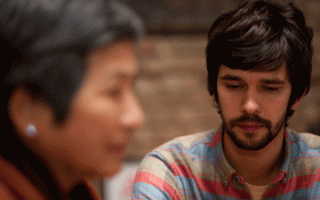Khaou’s two-hander begins with Junn (Cheng Pei-pei), a Chinese-Cambodian immigrant who lives in a retirement home on the behest of her son, Kai (Andrew Leung). Her sole visitor, Junn waits for hours on end for Kai to return to her side, with only music tapes and kindly old boy Alan (Peter Bowles) for additional company. It’s a surprise, then, when the sheepish Richard (Whishaw) arrives asking after her. A “friend” of Kai’s – or so he claims, despite the fact they were actually lovers – we learn that Junn’s son was recently killed in an accident, and that all Richard wants is to help look after Junn following his death. With Junn unable to speak English and Richard’s language skills outside of his native tongue non-existent, a translator (Naomi Christie) is welcomed in to facilitate communication between the two.
When it comes to the disparate souls of Lilting, as the old saying goes, “it’s all in the eyes”. An inevitable by-product of the obstructive language barrier, Junn and Richard gradually open themselves up to one another non-verbally: be it through sporadic glances of a shared grief, or the latter’s attempts to cook an authentic Chinese meal for the former. It’s in such small acts where the film’s best moments of quiet drama reside, particularly in one heartbreaking scene in which Junn compliments Richard on his use of chopsticks whilst cooking in the kitchen: “How else do you fry bacon?”, he replies. Remarkably, Kai transpires to be an almost ever-present throughout the duration despite his passing; his scent still lingering in the flat Richard and himself shared, his clothes adorned by the man he left behind. Khaou, meanwhile, moves through time and space incredibly fluidly, his floating camera drifting here and there as if spiritually linked to the deceased (see Gaspar Noé’s Enter the Void (2009) for an example of this cinematic approach pushed to its limits).
As compelling and as well-thought-out as Lilting’s gentle, LGBT-infused study of 21st century multiculturalism often is, there are points at which the film’s minor flaws are briefly exposed. Though a passingly enjoyable dalliance, there’s little to really glean from the relationship between Junn and picture postcard English gent Alan other than one rather barbed line about OAP hygiene. It’s easy to see why such dashes of levity were included, especially given the melancholy subject matter, but such is the draw of Whishaw and his exquisitely insular performance that the film almost audibly pines for him when he isn’t there. Ultimately, however, such slight reservations never truly detract from what is – for numerous reasons – a remarkable British debut from Khaou, if not the best of 2014 so far. Much like the spectral figure of Kai, Lilting looks set to linger on in the memory of those who seek it out for weeks, months and perhaps even years to come.
Daniel Green
//player.vimeo.com/video/97918218?title=0&byline=0&portrait=0&color=ff9933



